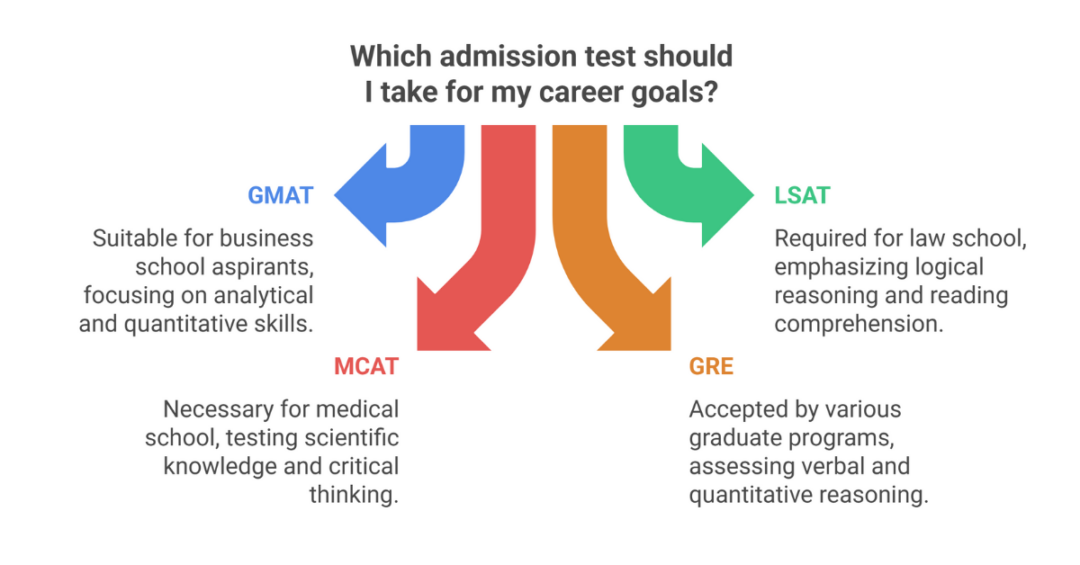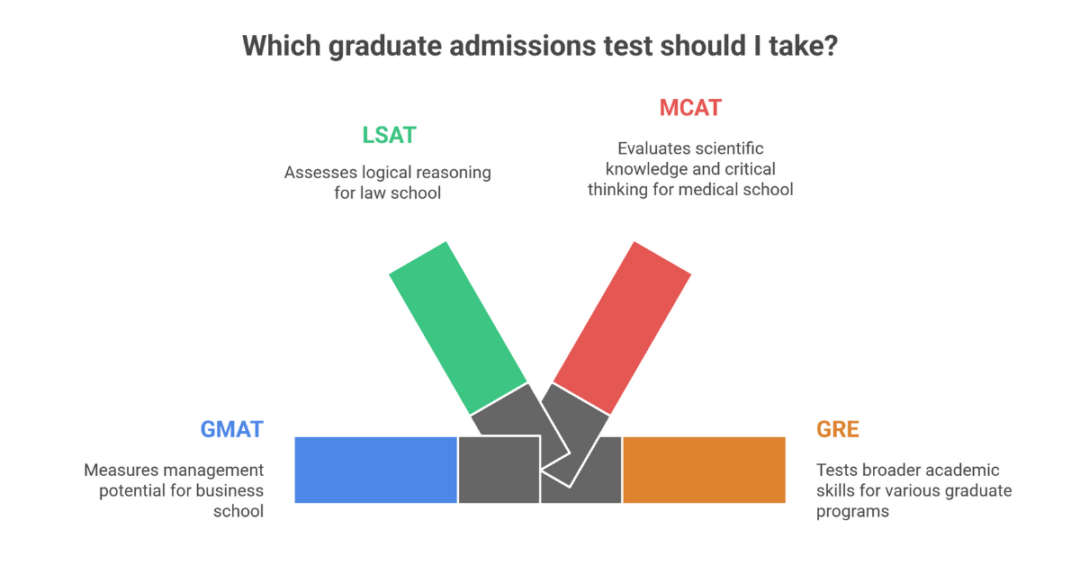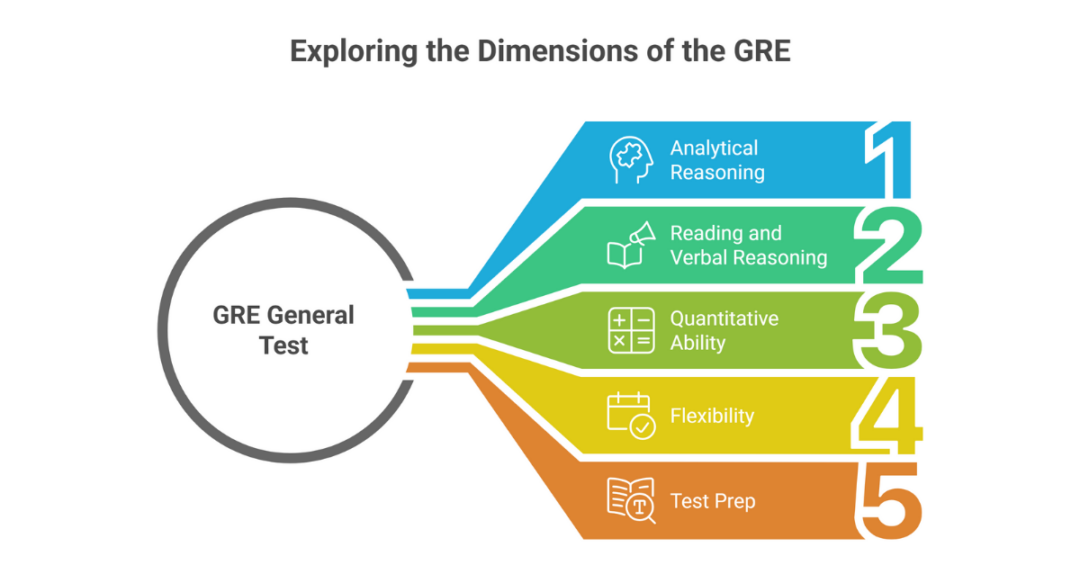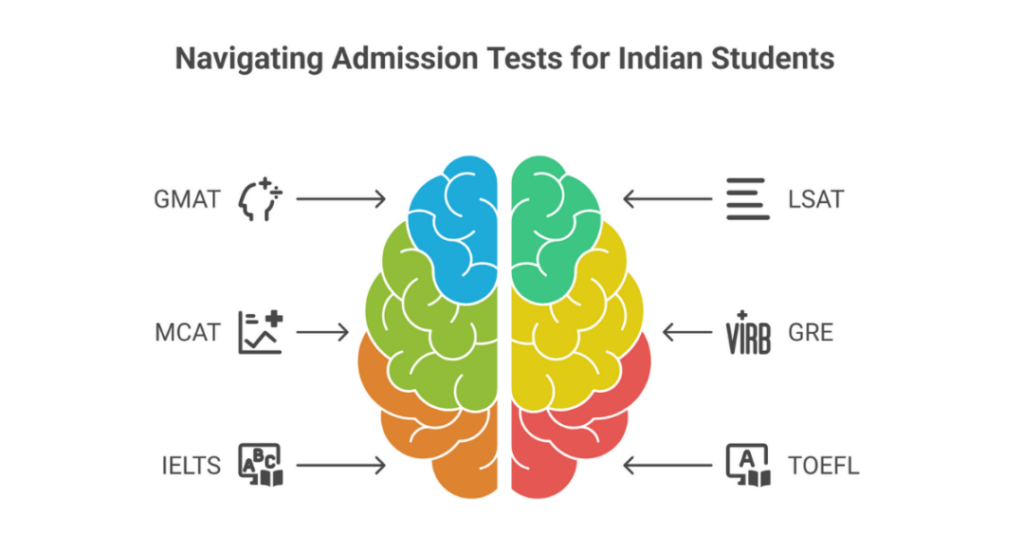7 August 2025
10 minutes read
GMAT LSAT MCAT GRE IELTS TOEFL: What Admission Tests Do You Need as an Indian Student?

Key Takeaways
- GMAT LSAT MCAT are specialized admission tests, each tailored to business, law, and medical school pathways respectively.
- GMAT LSAT MCAT test different skills—quantitative for GMAT, logical reasoning for LSAT, and scientific analysis for MCAT.
- GMAT LSAT MCAT scores are widely accepted, often valid for five years, and play a crucial role in securing top university seats.
Grad school admissions can seem overwhelming. Do you ask yourself: Which test will determine what I get to do with my future? In a world with so many admissions tests to choose from, you are not the only one.
Many prospective students have a hard time differentiating between the GMAT, LSAT, MCAT, SAT, ACT, IELTS, TOEFL and GRE; and many of those prospective students feel lost while they try to figure out which test corresponds to their career goals.
Making the wrong choice and taking the wrong test can lead to wasted time and money, and ultimately could undermine your quest to graduate school. However, we are going to make it simple! This article is going to clarify what these critical admissions tests all are, what you need to take and how to do it.
This includes the purpose of each test, what programs target the test, some key differences and beyond, to help ensure that you are on the right track for a successful post secondary experience.
What are the Most Common Standardized Tests like GRE GMAT LSAT MCAT IELTS and TOEFL? What do they Measure?
Let’s explore graduate admissions assessments. These tests are developed to assess your readiness to engage in advanced study, but each one has its own emphasis.

The popular options will be the GMAT (graduate management admission test) for graduate business school, the LSAT (law school admission test) for law school, the MCAT (medical college admission test) for medical school, or the GRE (graduate record examination) for any number of graduate programs.
The GMAT measures management potential, the LSAT measures logical reasoning, the MCAT measure scientific knowledge and critical thinking, and the GRE measures broader academic skills. Each test has target areas of inquiry to predict your success in each field to help the admissions committees consider your potential.
Graduate Management Admission Test (GMAT)
The GMAT is a critical component for business school admissions, including MBA programs at colleges all over the world. GMAT for abroad colleges is something that makes it a crucial exam to remember. This exam has respondents working to complete four assessments on the following categories: quantitative reasoning, verbal reasoning, integrated reasoning, and analytical writing.
The test is intentionally designed to assess the skills most relevant to business program completion. The GMAT’s unique format evaluates not only the level of knowledge, but also the crucial thinking and problem-solving skills of future business leaders. It is distinct in that it prioritizes logical reasoning skills similar to real-world business problems.
The quantitative section evaluates mathematical proficiency and the verbal section evaluates your language skills. It would be excellent to know about the GMAT lifetime limit as well. Together, these components indicate the candidate’s overall abilities, which help the admission committee to assess a candidate’s potential.
Who Needs to Take GMAT?
If your goal is to gain acceptance into world renowned business schools, particularly to MBA programs, the GMAT is likely in your future. The GMAT is for anyone who wants to pursue a position of accountability in business and management. You need to know GMAT is for which country.
In fact, going beyond just academic knowledge, the GMAT also assesses your critical analysis and reasoning skills in a way that is important in the field of business. The GMAT structure including quantitative sections and an analytical writing assessment are a true representation of evaluating real-world business decisions.
While some schools are accepting alternative tests, the GMAT is the gold standard or original test of assessment that still remains acceptable for many programs. The GMAT is challenging, more so with the quantitative sections, but the overall challenge of the GMAT creates the confidence as a reliable predictor of business school performance.
GMAT eligibility varies from college to college, so keep that in mind as well.
GMAT Exam Requirements
Ready to tackle the GMAT? Let’s break down what you’re up against. The exam is entirely computer-based and consists of four main sections:
- Quantitative reasoning
- Verbal reasoning
- Integrated reasoning
- Analytical writing assessment
You will see a variety of question types, from problem solving to data interpretation. The quantitative and verbal sections have starts as well and some different sections. The quantitative and verbal sections can be rough, fast and tough; studying some sample GMAT questions online will give you some experience.
The GMAT is not like some other graduate exams; there are no subject tests to concern yourself with. The writing assessment begins the exam and is followed by integrated reasoning. Then you have the heart of the GMAT – the verbal and quantitative sections.
Keep in mind that you will be responsible for your time management; you have approx 3.5 hours to show off your skills. Have a clear idea of the GMAT exam fees, colleges accepting GMAT scores, as well as the GMAT books that will help you prep for the exam.
Who Accepts a GMAT Score?
GMAT scores are given primarily to MBA programs and other graduate business programs worldwide. Most top universities accept these scores for management-oriented masters degrees. Understand GMAT is for what purpose, the importance of GMAT, as well as the benefits of taking a GMAT exam before deciding to go for it.
Even though the GMAT is primarily for business education, some graduate programs that do not focus on business may accept your GMAT score in place of a GRE. Always check with the institution you are targeting for their requirements.
Law School Admission Test (LSAT)
The LSAT is an important consideration for acceptance to law schools, made to assess skills which are critical to scoring well in law. It is different from other exams like SAT, MCAT, IELTS, GRE, and TOEFL. Successfully taking the LSAT includes demonstrating your critical thinking abilities, verbal reasoning abilities, and ability to evaluate complex information.

The structure of the test and its content focus on logical reasoning, analytical reasoning, and reading comprehension. Unlike some exams from other graduate schools, the LSAT test does not assess any prior specific legal knowledge. In short, the LSAT tests the ability to read, understand, and analyze arguments.
The reasoning section challenges you to think critically at a level above that of a good average. On test day, the LSAT has multiple-choice questions and a writing sample assignment. Generally, law schools require you to take this test to gain admission, meaning all potential lawyers are required to pass that hurdle.
Your results will indicate your ability to think critically about complex issues, and it demonstrates your preparedness for the level of rigorous thinking anticipated in law school and beyond.
Who Needs to Take an LSAT Exam?
If you are considering a career in law, the LSAT is likely part of your future. The LSAT is controlled by the law school admission council and is a mandatory requirement of every university and college law school; no, really.
Sure it may be just a box on the application that you have to check off, but your score on the LSAT carries weight with admissions committees, as it matters more for applicants gaining admittance to law school. The LSAT is supposed to be predictive of how well you will perform in law school, and therefore, admissions committees treat your LSAT seriously.
Many applicants to law schools take test preparation classes to improve on their score. Although some law schools are beginning to accept alternative tests, the LSAT is the gold standard. In addition, if you do end up going to law school, just remember, getting into law school is just one level of hurdles the LSAT will help you clear.
You will have assignments and exams in law school that require strong logical reasoning and critical reading skills that you develop and improve upon preparing for the LSAT. So, if law school is in your future, start now thinking about how and when to tackle the LSAT.
Medical College Admission Test (MCAT)
The MCAT is generally an important milestone in the educational path for medical school applicants. Regardless of your own experience with this substantial undertaking, keep in mind that the MCAT is more than just a regular test of scientific knowledge; you are also being assessed on your reading comprehension, critical thinking and problem-solving skills.
The MCAT is a test aimed to determine your preparedness for the demands of medical education, rather than just a test of general scientific knowledge. The MCAT covers a wider spectrum of topics, from biology and chemistry to psychology and sociology, mirroring the individualized education medical schools provide.
The exam’s scaled-down, standardized testing rubrics require you to apply scientific constructs in real-world scenarios that reflect the complex decision-making that emerges in patient care. The test is tremendously difficult with regard to gross body of knowledge; however, your success on the MCAT will open doors for you to enter great medical schools and start a career in health science.
Who Needs to Take MCAT?
If you’re interested in pursuing medical school or grad school in healthcare-related fields in the United States or Canada, then the MCAT is the way to go. Also, have an idea of the average med school GPA before applying. The MCAT exam is designed for those aspiring to be doctors, dentists, and some veterinarians.
It is a computer-based exam that will test you on numerous topics and various levels of difficulty. This is not a general exam; it is intended for the healthcare professions. The MCAT score you receive will provide you with a score relative to how well you performed, and the questions you answer vary in difficulty depending on your performance.
If you answer questions in a certain way, the computer can randomize new questions based on your prior answers. The MCAT exam will not only test your ability to recall various healthcare-based concepts and ideas, but it is designed for you to apply the scientific concepts you learned and make decisions based in medical situations.
If you’re wondering whether you need to take it, review most medical admissions pages, the admissions page for most schools will answer your specific questions.
And remember, the MCAT may be difficult, however, the MCAT is your opportunity to show medical admissions committees that you are prepared for the individualized and personalized education the unique graduate curriculum provides at medical school.
Graduate Record Examinations (GRE)
The GRE General Test is a flexible exam used by many graduate programs, including some MBA programs. The GRE General Test assesses your analytical reasoning and reading and verbal reasoning skills, as well as quantitative ability.

The GRE Revised General Test released in 2011 has an unscored section for research. The GRE Subject Tests assess fields of study, such as science, social science, humanities, etc., whereas the GRE General Test assesses readiness for academic work across graduate programs. Many take part in GRE test prep to improve their scores.
Applicants need to know the basics of the exam like whether GRE has negative marking or not. The GRE is also flexible since tests in the General Test are available throughout the calendar year. This helpful for applicants who have tight schedules.
If you are applying for graduate school in science, humanities, or business, a strong GRE score can allow you to apply to top programs. Keep in mind, that while the GRE General Test is widely accepted, some programs may require additional GRE subject tests in a particular field.
Who Needs to Take GRE Exam?
The GRE exam is geared mostly to those test takers planning on attending graduate school in the arts and sciences, engineering, or some graduate level business programs. The GRE is an especially nice option for students who may be uncertain about the specific graduate program they would like to enter, and many different graduate programs accept the GRE score for admission purposes.
If you are considering any type of master’s degree, or doctoral program, or even some educational business degrees, the GRE is typically your best option. But before enrolling for the GRE exam, it is always a good idea to check with graduate schools you may want to apply to in order to verify their admission requirements.
What are the GRE Exam Requirements?
The GRE is a computer-based exam consisting of three main sections: Verbal Reasoning, Quantitative Reasoning, and Analytical Writing. The GRE takes about 3 hours and 45 minutes to complete in total.
The GRE exam has two types of adaptive sections (Verbal and Quantitative)- the questions get harder or easier based on how well you do on the questions. You will have to answer various types of questions including multiple-choice, numeric-entry, and essay writing.
No particular major is needed to be successful on the GRE exam, however, a strong command of critical thinking skills and basic mathematics skills are very important! You can crack GRE in 2 months or if you are short in time, there are ways to crack GRE in just one month as well.
Who Accepts a GRE Score?
A diverse range of graduate and professional institutions around the globe accept GRE scores as part of their admissions requirements. Most graduate programs in the arts and sciences, as well as engineering and many graduate business programs accept GRE scores for admission considerations.

Some law programs and a few medical programs consider using the GRE as an option to their regular examination requirements. Many fellowship programs and even some employers provide GRE scores as part of their evaluation process, as well. Acceptance policies can differ from institution to institution so it’s important to confirm requirements with each school you apply to.
Conclusion
It’s is important for every Indian student to know that making the right admission test choices is needed to achieve academic success outside of India. There are various tests, like the GMAT, LSAT, MCAT, GRE, IELTS and TOEFL; there will be some form of construction and purposes that is unique to each test.
There are tests like the LSAT that consists of a total of five multiple-choice sections that includes two logical reasoning sections. The GMAT and GRE tests are scored in a variety of ways, and as emphasis is placed on analytical and verbal reasoning. The scores for most tests are valid for five years, making strategic planning very important.
Many of these tests can be retaken five times during a two-year period but the difference in challenge of the second or third attempts can be a steep incline, as expectations are heightened.
As always, you should also consider your five year scores and your previous verbal performance with respect to plausible improvements, and reach out to programs that maintain focus on possible improvements.
Transform your GMAT preparation with Ambitio’s expert guidance. Our comprehensive approach includes personalized study plans, adaptive practice tests, and strategic insights, all designed to enhance your understanding and performance across the exam’s quantitative and verbal sections.
FAQs
What is the difference between GMAT LSAT MCAT in terms of test structure?
The GMAT LSAT MCAT exams each follow distinct structures tailored to different career paths. GMAT LSAT MCAT test candidates on business reasoning, legal logic, and scientific thinking respectively. When preparing, understanding the unique sections of GMAT LSAT MCAT helps target your study plan.
Who needs to take GMAT LSAT MCAT for graduate admission?
If you’re applying to business, law, or medical school, you’ll likely need one of the GMAT LSAT MCAT exams. The GMAT LSAT MCAT tests are not interchangeable, each linked to specific professional degrees. Be sure to research which of the GMAT LSAT MCAT is required for your chosen field.
How long are GMAT LSAT MCAT scores valid for?
Scores for GMAT LSAT MCAT are typically valid for five years from the test date. Planning ahead ensures your GMAT LSAT MCAT scores are accepted during your application cycle. Always check whether universities accept GMAT LSAT MCAT scores from previous years.
Are GMAT LSAT MCAT exams difficult to pass?
The GMAT LSAT MCAT exams are considered challenging due to their specialized content and high competition. Many students find parts of GMAT LSAT MCAT—like analytical writing or logical reasoning—especially tough. Consistent preparation is key to succeeding in GMAT LSAT MCAT.
Can I prepare for GMAT LSAT MCAT together?
Although it may be tempting, preparing for GMAT LSAT MCAT together isn’t recommended since each requires a different approach. The GMAT LSAT MCAT exams test different knowledge areas—quant, law logic, and science respectively. It’s better to focus on one GMAT LSAT MCAT exam based on your goals.
How many times can I take GMAT LSAT MCAT?
You can take GMAT LSAT MCAT multiple times, though limits vary by exam—up to five times in a two-year period for GMAT. Retaking GMAT LSAT MCAT gives you a chance to improve, but repeated attempts of GMAT LSAT MCAT require serious preparation.
Why do universities require GMAT LSAT MCAT scores?
Universities use GMAT LSAT MCAT scores to assess readiness for graduate-level academic rigor. The GMAT LSAT MCAT results provide standardized benchmarks for skills like reasoning, problem-solving, and comprehension. A strong GMAT LSAT MCAT score can boost your chances of admission and scholarships.

You can study at top universities worldwide!
Get expert tips and tricks to get into top universities with a free expert session.
Book Your Free 30-Minute Session Now! Book a call now




























